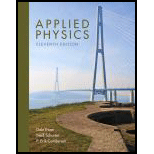Solutions for EBK APPLIED PHYSICS
Problem 1RQ:
Physics is a field of study that governs a. how the planets orbit the sun. b. the rate at which...Problem 2RQ:
Who among the following is an example of a theoretical physicist? a. Archimedes, who measured the...Problem 4RQ:
Which of the following is not considered a branch of physics? a. Thermodynamics b. Astronomy c....Problem 5RQ:
Analyzing the braking distance of a sports car would most likely utilize which field of physics? a....Browse All Chapters of This Textbook
Chapter 0 - An Introduction To PhysicsChapter 1 - The Physics Tool KitChapter 1.2 - Introduction To The Metric SystemChapter 1.3 - Scientific NotationChapter 1.4 - LengthChapter 1.5 - Area And VolumeChapter 1.6 - Other UnitsChapter 1.7 - Measurement: Significant Digits And AccuracyChapter 1.8 - Measurement: PrecisionChapter 1.9 - Calculations With Measurements
Chapter 2 - Problem SolvingChapter 2.1 - FormulasChapter 2.2 - Substituting Data Into FormulasChapter 2.3 - Problem-solving MethodChapter 3 - VectorsChapter 3.1 - Vectors And ScalarsChapter 3.2 - Components Of A VectorChapter 3.3 - Addition Of VectorsChapter 4 - MotionChapter 4.1 - Speed Versus VelocityChapter 4.2 - AccelerationChapter 4.3 - Uniformly Accelerated Motion And Free FallChapter 4.4 - Projectile MotionChapter 5 - ForceChapter 5.2 - Force And The Law Of AccelerationChapter 5.3 - Gravity And WeightChapter 5.4 - FrictionChapter 5.5 - Total Forces In One DimensionChapter 6 - MomentumChapter 6.1 - Momentum And ImpulseChapter 6.2 - Collisions In One DimensionChapter 6.3 - Collisions Of Equal Masses In Two DimensionsChapter 7 - Concurrent And Parallel ForcesChapter 7.1 - Forces In Two DimensionsChapter 7.2 - Concurrent Forces In EquilibriumChapter 7.3 - TorqueChapter 7.4 - Parallel ForcesChapter 7.5 - Center Of GravityChapter 8 - Work And EnergyChapter 8.1 - WorkChapter 8.2 - PowerChapter 8.3 - EnergyChapter 8.4 - Conservation Of Mechanical EnergyChapter 9 - Rotational MotionChapter 9.1 - Measurement Of Rotational MotionChapter 9.3 - Centripetal ForceChapter 9.4 - Power In Rotational SystemsChapter 9.6 - GearsChapter 9.7 - Pulleys Connected With A BeltChapter 10 - Simple MachinesChapter 10.2 - The LeverChapter 10.3 - The Wheel-and-axleChapter 10.4 - The PulleyChapter 10.5 - The Inclined PlaneChapter 10.6 - The ScrewChapter 10.8 - Compound MachinesChapter 10.9 - The Effect Of Friction On Simple MachinesChapter 11 - Universal Gravitation And Satellite MotionChapter 11.1 - Universal GravitationChapter 11.3 - Satellite MotionChapter 12 - MatterChapter 12.2 - Properties Of SolidsChapter 12.5 - DensityChapter 13 - FluidsChapter 13.1 - Hydrostatic PressureChapter 13.2 - Hydraulic PrincipleChapter 13.3 - Air PressureChapter 13.4 - BuoyancyChapter 13.5 - Fluid FlowChapter 14 - Temperature And Heat TransferChapter 14.1 - TemperatureChapter 14.2 - HeatChapter 14.3 - Heat TransferChapter 14.4 - Specific HeatChapter 14.5 - Method Of MixturesChapter 14.6 - Expansion Of SolidsChapter 14.7 - Expansion Of LiquidsChapter 14.8 - Change Of PhaseChapter 15 - Properties Of GasesChapter 15.1 - Charles's LawChapter 15.2 - Boyle's LawChapter 15.3 - Charles's And Boyle's Laws CombinedChapter 16 - Wave Motion And SoundChapter 16.2 - Electromagnetic WavesChapter 16.4 - The Doppler EffectChapter 16.6 - Simple Harmonic MotionChapter 17 - Basic ElectricityChapter 17.3 - Coulomb's LawChapter 17.4 - Electric FieldsChapter 17.5 - Simple CircuitsChapter 17.6 - Ohm's LawChapter 17.7 - Series CircuitsChapter 17.8 - Parallel CircuitsChapter 17.9 - Compound CircuitsChapter 17.10 - Electric InstrumentsChapter 17.12 - Cells In Series And ParallelChapter 17.13 - Electric PowerChapter 18 - MagnetismChapter 18.2 - Magnetic Effects Of CurrentChapter 19 - Alternating Current ElectricityChapter 19.1 - What Is Alternating Current?Chapter 19.2 - Ac PowerChapter 19.3 - InductanceChapter 19.4 - Inductance And Resistance In SeriesChapter 19.5 - CapacitanceChapter 19.6 - Capacitance And Resistance In SeriesChapter 19.7 - Capacitance, Inductance, And Resistance In SeriesChapter 19.8 - ResonanceChapter 19.10 - Commercial Generator Power OutputChapter 20 - LightChapter 20.2 - The Speed Of LightChapter 20.3 - Light As A WaveChapter 20.4 - Light As A ParticleChapter 20.5 - PhotometryChapter 21 - Reflection And RefractionChapter 21.5 - The Mirror FormulaChapter 21.10 - Images Formed By Diverging LensesChapter 22 - ColorChapter 23 - Survey Of Modem PhysicsChapter 23.3 - Atomic Structure And Atomic SpectraChapter 23.4 - Quantum Mechanics And Atomic PropertiesChapter 23.5 - The Nucleus-structure And PropertiesChapter 23.6 - Nuclear Mass And Binding EnergyChapter 23.7 - Radioactive DecayChapter 23.9 - Detection And Measurement Of RadiationChapter 24 - Special And General RelativityChapter 24.2 - Special Theory Of RelativityChapter A.1 - Signed NumbersChapter A.2 - Powers Of 10Chapter A.3 - Solving Linear EquationsChapter A.4 - Solving Quadratic EquationsChapter A.5 - Right-triangle TrigonometryChapter A.6 - Law Of Sines And Law Of CosinesChapter B.2 - Unit Analysis And Conversion FactorsChapter D.4 - Finding A Power
Sample Solutions for this Textbook
We offer sample solutions for EBK APPLIED PHYSICS homework problems. See examples below:
Chapter 0, Problem 1RQChapter 1, Problem 1RQChapter 2, Problem 1RQChapter 3, Problem 1RQChapter 4.1, Problem 21PChapter 4, Problem 1RQChapter 5, Problem 1RQChapter 6, Problem 1RQChapter 7, Problem 1RQ
Chapter 8, Problem 1RQChapter 9, Problem 1RQChapter 10, Problem 1RQChapter 11, Problem 1RQDescription: According to the basic definition of an atom, it consists of a proton, neutron, and an...Chapter 13, Problem 1RQChapter 14, Problem 1RQReason: Boyle’s law explains that if temperature of any gas is kept constant, the volume occupied by...Reason: The transference of electricity or heat through any medium from one body to another, given...Chapter 17, Problem 1RQChapter 18, Problem 1RQChapter 19, Problem 1RQChapter 20, Problem 1RQChapter 21, Problem 1RQAn electromagnetic spectrum’s portion, which is visible to eye, is known as visible spectrum. The...The atom particle consists of nucleus and electrons, in which electrons are located around the...Chapter 24, Problem 1RQ
More Editions of This Book
Corresponding editions of this textbook are also available below:
Applied Physics
10th Edition
ISBN: 9780136116332
EBK APPLIED PHYSICS
10th Edition
ISBN: 9780133004236
Lab Manual For Applied Physics
10th Edition
ISBN: 9780132109277
Applied Physics
11th Edition
ISBN: 9780132719865
Applied Physics (11th Edition)
11th Edition
ISBN: 9780134159386
Applied Physics (11th Edition)
11th Edition
ISBN: 9780134241142
EBK APPLIED PHYSICS
11th Edition
ISBN: 8220102019928
Applied Physics- Text Only
8th Edition
ISBN: 9780006787792
Applied Physics
5th Edition
ISBN: 9780137715695
Related Physics Textbooks with Solutions
Still sussing out bartleby
Check out a sample textbook solution.
